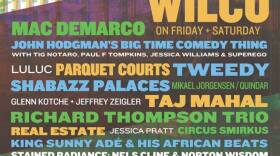Dawid’s critically acclaimed 2019 debut “The Oracle” put her on the map in a cosmic explosion of spiritual jazz. It’s an intoxicating, exploratory record that interrogates Black identity with a fearless intensity, snaking its way through looming, existential questions with undeniable aplomb.
As she prepares for her debut at Wilco’s regular festival, Dawid says the last two years have allowed her to reconsider her live set.
“Pre-pandemic, most of my shows were me and my clarinet and my piano," she told WAMC. "After pandemic, after being in the crib, experimenting, now it's like, oh, I've got like, a few more clarinets. You know, now I have electronics and pedals that I'm pushing, and working with loopers, and working with things that expand me as a solo artist. Like, I got everything I need. And so, like, I try to bring everything I can do, you know, production and hip hop, and all of that, plus the improvisational part. So I almost think of- I don't think of like my solo show as a show, but I think of it as like a service, you know? So, I have my songs and things that I'm doing, but based off of the crowd or who I'm with, it's going to bend to that. Plus, I've added visuals. You know, that's another thing that I wanted to add.”
The pandemic also allowed Dawid to explore new avenues for another one of her passions: education. She taught a course on “Great Black Music” to the residents of the Cook County Juvenile Temporary Detention Center.
“Right when the pandemic started, they wanted to still have arts programs for the young men in the detention center, so they opened it up to have Zoom classes," explained Dawid. "And so basically, the Old Town School of Folk [Music] here in Chicago, which is a great organization, hit me up and were like, you want to do a class, you can do class, whatever. And I was like, yes.”
For Dawid, who was named 2021 "Chicagoan of the Year in Jazz" by the Chicago Tribune and studied classical music at Roosevelt University, the detention center class was as much an education for her as it was for her students.
“So I always start the class with, who are the Black composers of today? And I asked the young men, like, who are the Black composers of today? And we know who they are. They're Lil Durk, they're G Herbo," said Dawid. "These are their heroes, you know? Now, the music of today, a lot of people have issues with it, because it's very visceral and these young people talk about a whole bunch of stuff that, you know, not all audiences can really sit through. But I realized, like, despite all of that, they are the Black musicians and composers of today. So I actually had to take time to really study their work. I really studied them as composers, and they really liked that.”
Much of Dawid’s work centers around the unfettered imagination of Afrofuturism, and she counts Marshall Allen – long the right-hand man of Afrofuturist legend Sun Ra – among her collaborators. As the 2022 artist in residence for the New York Winter Jazz Festival, she premiered a composition titled “Afro Town Topics: An Afrofuturist Mythological Musical Revue.” While her students at the detention center took to ideas around the future and present of Black music, Dawid found their engagement with the past troubling.
“That’s when I saw a lot of disconnect, and it concerned me, because I think what it is, is because when we talk about Black music of the past, it always kind of starts with this traumatic past," she told WAMC. "And, you know, so I had to have, like, these kind of sensitivities that, you know, I've got a bunch of young men who are already in a traumatic situation. I don't know why they were locked up. I don't know what they've done. All I have is, like, a group of young, amazing, intelligent young men. And so to revisit the past music, which is kind of steeped in trauma of slavery, and all of that- But that's a big important part to why Black music is so important, and why it's so powerful is because it came out of that.”
Identifying that disconnect proved an inspiration onto itself.
“I've been trying to, you know, really think about how to get a pedagogy available for Black youth to be able to study music of the past without feeling so traumatized by it," said Dawid. "They still feel like they're not, they don't have a lot of worth. And then to tell them over and over again, oh, you started with slavery, oh, you started in the in the slave field, and that's where the music starts. It's like, we have to kind of rethink that, about how we teach children today and how we can honor the past too. But I did notice that disconnect. And so that's something like I'm perpetually always thinking about, because in the next 10 years, I plan on having my own school specifically for Black youth. You know, there needs to be that more than anything.”
Angel Bat Dawid performs at Solid Sound on the campus of MASS MoCA in North Adams, Massachusetts on Saturday, May 28th.









